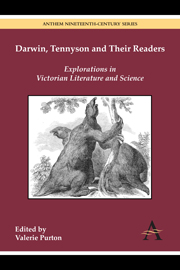Book contents
- Frontmatter
- Contents
- Introduction
- Chapter 1 Tennyson's ‘Locksley Hall’: Progress and Destitution
- Chapter 2 ‘Tennyson's Drift’: Evolution in The Princess
- Chapter 3 History, Materiality and Type in Tennyson's In Memoriam
- Chapter 4 Darwin, Tennyson and the Writing of ‘The Holy Grail’
- Chapter 5 ‘An Undue Simplification’: Tennyson's Evolutionary Afterlife
- Chapter 6 ‘Like a Megatherium Smoking a Cigar’: Darwin's Beagle Fossils in Nineteenth-Century Popular Culture
- Chapter 7 ‘No Such Thing as a Flower […] No Such Thing as a Man’: John Ruskin's Response to Darwin
- Chapter 8 Darwin and the Art of Paradox
- Chapter 9 Systems and Extravagance: Darwin, Meredith, Tennyson
- Chapter 10 T. H. Huxley, Science and Cultural Agency
- Notes on Contributors
Introduction
- Frontmatter
- Contents
- Introduction
- Chapter 1 Tennyson's ‘Locksley Hall’: Progress and Destitution
- Chapter 2 ‘Tennyson's Drift’: Evolution in The Princess
- Chapter 3 History, Materiality and Type in Tennyson's In Memoriam
- Chapter 4 Darwin, Tennyson and the Writing of ‘The Holy Grail’
- Chapter 5 ‘An Undue Simplification’: Tennyson's Evolutionary Afterlife
- Chapter 6 ‘Like a Megatherium Smoking a Cigar’: Darwin's Beagle Fossils in Nineteenth-Century Popular Culture
- Chapter 7 ‘No Such Thing as a Flower […] No Such Thing as a Man’: John Ruskin's Response to Darwin
- Chapter 8 Darwin and the Art of Paradox
- Chapter 9 Systems and Extravagance: Darwin, Meredith, Tennyson
- Chapter 10 T. H. Huxley, Science and Cultural Agency
- Notes on Contributors
Summary
‘I have sometimes found in a song of Tennyson the most fitting garment of a thought engendered by a generalisation of Science.’
—Richard Owen, 1859‘[T]here is a community establishing itself between literature and science, and I rejoice in that community […] for the highest aim of science and literature, is the same; it is to diffuse, to reveal and to embody truth.’
—Thomas Henry Huxley, 1860‘Presented rightly to the mind, the discoveries and generalisations of modern science constitute a poem more sublime than has ever yet addressed the human imagination. The natural philosopher today may dwell amid conceptions which beggar those of Milton.’
—John Tyndall, 1863Charles Darwin and Alfred, Lord Tennyson were exact contemporaries, born in 1809, who came to have emblematic roles as representatives, respectively, of science and literature in the Victorian age. Their juxtaposition in this volume of essays is indicative of the easy commerce between literature and science during that period and provides a salutary reminder that the two categories need to be understood within their historical context rather than assumed to be trans-historical absolutes. Readers of Darwin and Tennyson included all the significant thinkers of the day, in every field. Two — John Ruskin and Thomas Henry Huxley — are given special attention in this collection, in which a range of twenty-first-century critics from various literary disciplines address issues raised by the interaction of Victorian literature and science.
- Type
- Chapter
- Information
- Darwin, Tennyson and their ReadersExplorations in Victorian Literature and Science, pp. vii - xxiiPublisher: Anthem PressPrint publication year: 2013



